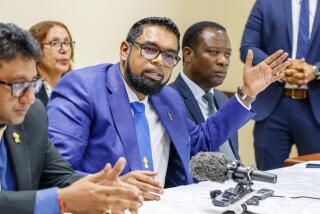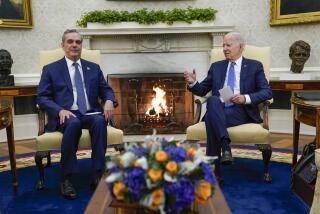S. American summit shows cracks in unity
- Share via
BUENOS AIRES — South American leaders emphasized unity Tuesday at the end of a two-day regional energy summit in Venezuela, but the smiles masked deep divisions over energy and other issues.
Recent feuds among the 12 participating countries included differences between Brazil and Venezuela over vegetable-based fuels and a nasty quarrel between Venezuela and Chile over press freedoms.
The disputes again highlighted the roadblocks facing Venezuelan President Hugo Chavez as he tries to spread his “Bolivarian” vision of a unified, left-leaning continent allied against Washington.
“This exposes enormous tensions and divisions in the hemisphere,” said Michael Shifter, a senior analyst with the Inter-American Dialogue, a Washington policy center. “There’s a lot of uneasiness with Chavez, both in terms of his economic policy and his political ideas.”
Most of the heads of state who gathered this week on Venezuela’s Margarita Island are part of the left-leaning “pink tide” that has swept to power in Latin America in recent years. But they have varying agendas on several issues, especially energy. Several of the nations also have long-standing rivalries over borders.
Venezuela’s Chavez has worked to frustrate Washington’s interests in Latin America, whereas other South American nations have sought more trade with the United States.
Peruvian President Alan Garcia, who quarreled viciously with Chavez during Garcia’s recent electoral run, shunned the meeting. He is scheduled to meet with President Bush next week in Washington. A onetime darling of the international left, Garcia is keen to see the U.S. Congress approve a recently negotiated free-trade pact between the two nations. Chile already has a free-trade accord with Washington.
Chavez has denounced U.S.-led free trade pacts as “imperialist” throwbacks.
The most visible dispute here was the clash between Venezuela and Brazil about biofuels -- vegetable-based alternative fuels. Chavez, whose nation is a major oil producer, has assailed the biofuel movement as a misuse of agricultural land that should be utilized to provide food for the world’s hungry.
On Tuesday, Chavez appeared to moderate his earlier denigration of vegetable-based fuels, even suggesting that Venezuela might purchase Brazilian ethanol.
“We are not against biofuels,” Chavez said. The ingredients to make the fuel are the issue, he added.
Brazil has entered into an agreement with the United States to promote greater production of ethanol, generally made from sugar cane in Brazil and from corn in the United States.
Chavez cast Brazilian ethanol as a more palatable alternative because, he said, it uses less land than the U.S. version.
The Chilean press has noted the frostiness in the body language of Chilean President Michele Bachelet during her visit to Venezuela. A lifelong socialist who is a close ally of Washington, Bachelet has never been comfortable with Chavez’s evangelical socialism, his constant U.S.-bashing and his strategic alliance with landlocked Bolivia, which covets access to the Pacific Ocean through territory it lost to Chile in a 19th century war.
Chile and Venezuela have been engaged in a rancorous battle that arose last week when the Chilean Senate condemned Chavez’s decision not to renew the license of Radio Caracas Television, a broadcast outlet that had been a fierce critic of his government.
Chavez told Chile to mind its own business, blaming “the extreme fascist right” linked to Chile’s former dictatorship for the congressional action. Bachelet, who was arrested during the dictatorship and forced into exile, defended the Senate’s right to speak out. There had been considerable speculation that the feud would derail her planned trip to Venezuela.
Before Bachelet’s arrival, however, Chavez apologized to the Chilean president.
“Bachelet must seem a nuisance to Chavez,” said Jose Rodriguez Elizondo, a professor of international relations at the University of Chile and a columnist for La Tercera newspaper in Santiago. “She is a socialist president who has good relations with governments demonized by the Venezuelan leader, starting with George W. Bush.”
*
Andres D’Alessandro of The Times’ Buenos Aires Bureau contributed to this report.
More to Read
Sign up for Essential California
The most important California stories and recommendations in your inbox every morning.
You may occasionally receive promotional content from the Los Angeles Times.













